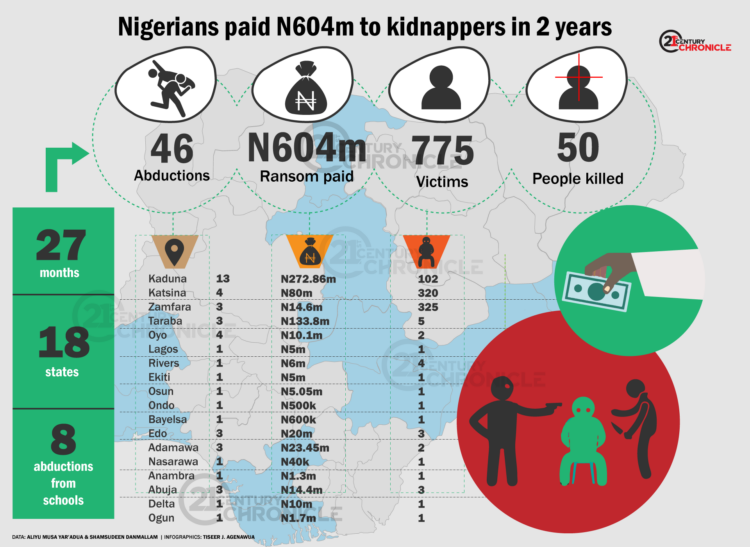More than half a billion naira has been paid to kidnappers as ransom in at least 46 abductions in the last two years across the country, investigations by 21st CENTURY CHRONICLE, have shown.
Analysis of published media reports by this newspaper revealed that about 775 people were kidnapped in at least 46 incidents were ransom was paid to secure their release.
A total of N604 million was paid by families, friends, institutions, and governments to free the victims abducted across 18 states between January 2019 and April 2021.
However, this figure represents only incidents reported by the media; it doesn’t include many other cases of abduction were ransom was paid but without being reported.
Investigations by this newspaper also revealed that at least 50 of the abducted people were killed by their captors during the period under review.
The analysis shows that eight of the abduction incidents happened in schools, and hundreds of students taken away from their dormitories.
At least 300 students recently abducted from Kebbi and Niger states are still in captivity with their captors demanding hundreds of millions as ransom.
On June 17, about 110 students were taken away from the Federal Government College, Birnin Yauri, Kebbi state when bandits raided the college, killing a policeman and injuring many.
About a fortnight before the Kebbi incident, over 150 pupils were abducted from Malam Tanko Islamiyya in Tegina, Niger State. The pupils mostly below the age of five are still in captivity, with their captors demanding N150 million ransom.
The current spate of students abduction was renewed with the dawn raid of Government Science Secondary School, Kankara in Katsina state, on December 11, 2020; and over 300 students of the school abducted. They were released after ransom was paid by the state government.
The December 11 Kankara incident, the first mass students’ abduction outside the Boko Haram-plagued northeast, spread fears across the country, fueling large scale shutdowns of public schools in northern states.
An earlier investigation by 21st CENTURY CHRONICLE revealed that at least 4,034 schools were shut down across eight states within the first three months after the Kankara schoolboys abduction.
Findings by this newspaper have shown that northwest is the zone with the highest incident of ransom payment, followed by the northeast, then north central and south-south.
The federal government says it is working assiduously to stop the menace. The Minister of Communication and Digital Economy, Dr. Isa Pantami, said last month that the policy compelling Nigerians to obtain a National Identification Number (NIN) has substantially reduced incidents of banditry and kidnapping.
He said the policy is aimed at stopping kidnapping for ransom as kidnappers use unregistered SIM cards to negotiate ransom with families of abducted victims.
He said, “When I was assigned to supervise the sector on 24, August 2019, unregistered, and partial registered sims were being used to perpetrate crime in the country. Nobody knew the total number of unregistered sims.”
He announced that: “From end of September 2019, to 2020, you will discover that even kidnapping and banditry reduced to the barest minimum. It was a time that hardly can you spend one month or more without hearing about kidnapping.”
The minister, however, admitted that “the more you come up with policies to make the system effective the more criminals will come up with another strategy to compromise the policies.”
Also, the Senate is considering a bill that seeks to prohibit the payment and receipt of ransom for the release of any person kidnapped, imprisoned or wrongfully confined.
According to the bill, Nigerians who pay ransom to kidnappers and kidnappers who receive ransom risk 15 years imprisonment.
The Terrorism Prevention (Amendment) Bill, 2021, which scaled second reading during plenary is sponsored by Senator Ezenwa Francis Onyewuchi.
The senator said proposed legislation seeks to amend the Terrorism (Prevention) Act, 2013 to outlaw the payment of ransom to abductors, kidnappers and terrorists for the release of any person who has been wrongfully confined, imprisoned or kidnapped.
The bill essentially seeks to substitute for section 14 of the Principal Act a new section to read, “Anyone who transfers funds, makes payment or colludes with an abductor, kidnapper or terrorist to receive any ransom for the release of any person who has been wrongfully confined, imprisoned or kidnapped is guilty of a felony and is liable on conviction to a term of imprisonment of not less than 15 years.”
Other avenues of checkmating kidnapping for ransom include negotiation with the bandits which was adopted by some state governors. Some governors, however, rejected the idea of bringing the bandits to the negotiation table, saying that the strategy has failed in the past.









